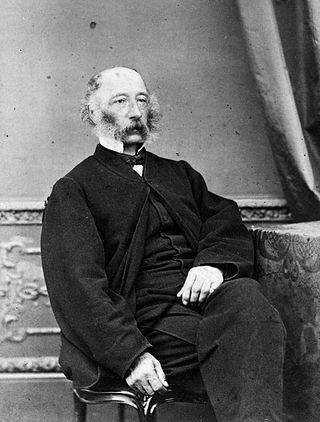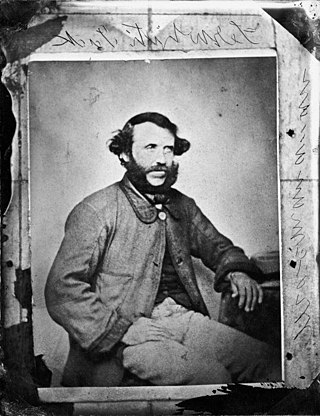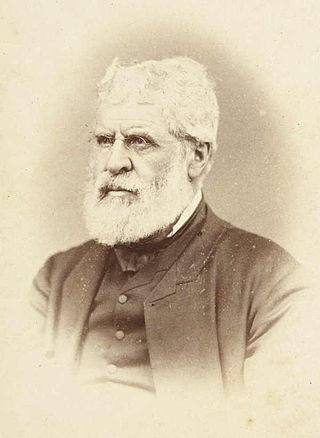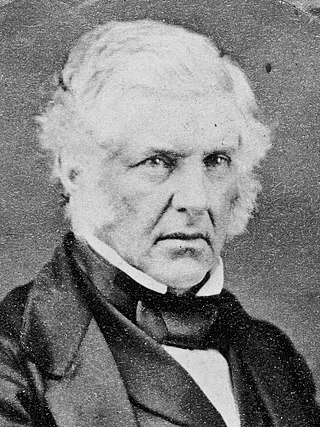Related Research Articles
Samuel Revans was a New Zealand newspaper owner, entrepreneur and politician. He was the Father of Journalism in New Zealand.
Robert Hart was a 19th-century New Zealand politician.
The 2nd New Zealand Parliament was a term of the Parliament of New Zealand. It opened on 15 April 1856, following New Zealand's 1855 election. It was dissolved on 5 November 1860 in preparation for 1860–61 election. The 2nd Parliament was the first under which New Zealand had responsible government, meaning that unlike previously, the Cabinet was chosen by Parliament rather than by the Governor-General of New Zealand.

Sir William Fitzherbert was a New Zealand politician. He served as Minister of Finance, Speaker of the House of Representatives, and Speaker of the Legislative Council.

The video games Star Wars: Knights of the Old Republic (2003) and Star Wars Knights of the Old Republic II: The Sith Lords (2004) features a large cast of characters noted for its diversity and is the subject of significant discussion from gaming magazines and websites.

Terawhiti Station is one of New Zealand's oldest and largest sheep stations, located along the south coast of Wellington. Terawhiti Station has seen a diverse range of land uses over the past 160 years. Originally a cattle station, Terawhiti grew into one of New Zealand's largest sheep stations before returning to cattle in 1993. The station originally consisted of the upraised marine terrace at Tongue Point on Wellington's south coast and was purchased by two Wellington businessmen Samuel Revans and William Mein Smith following the sale of Crown 'waste lands'. Captain William Barnard Rhodes later bought Revans’s land at Tongue Point stocking it with shorthorn cattle. His young manager, James McMenamen, later bought the Tongue Point farm and neighbouring blocks, forming Terawhiti Station and (later) Te Kamaru Station.

Henry Samuel Chapman was an Australian and New Zealand judge, colonial secretary, attorney-general, journalist and politician.

The 1856 New York state election was held on November 4, 1856, to elect the governor, the lieutenant governor, a Canal Commissioner, an Inspector of State Prisons and the Clerk of the Court of Appeals, as well as all members of the New York State Assembly.
Hutt was a New Zealand parliamentary electorate. It was one of the original electorates in 1853 and existed during two periods until 1978. It was represented by 13 Members of Parliament.

Star Wars: The Old Republic is a massively multiplayer online role-playing game (MMORPG) based in the Star Wars universe. Developed by BioWare Austin and a supplemental team at BioWare Edmonton, the game was announced on October 21, 2008. The video game was released for the Microsoft Windows platform on December 20, 2011 in North America and part of Europe. It was released in Oceania and Asia on March 1, 2012.
Members of the New South Wales Legislative Assembly who served in the sixth parliament of New South Wales held their seats from 1869 to 1872. The 1869–70 election was held between 3 December 1869 and 10 January 1870 with parliament first meeting on 27 January 1870. There were 72 members elected for 52 single member electorates, 6 two member electorates and 2 four member electorates. Due to a change in the Constitution of New South Wales the maximum term of this parliament was reduced from 5 years to 3. However the assembly was dissolved after only 25 months after the third government of Sir James Martin lost a vote of supply. The Speaker was William Arnold.
George Hart was a 19th-century Member of Parliament in the Canterbury region of New Zealand.

The Town of Christchurch by-election in 1860 was triggered by the resignation of Richard Packer as the Member of the House of Representatives for the Town of Christchurch electorate, and occurred during the term of the 2nd New Zealand Parliament. The previous representative of the electorate, the politician Henry Sewell, had returned after three years in England and the general expectation was that Sewell would be the sole contender for election. The Lyttelton Times wrote several provocative editorials, generally endorsing Sewell for his obvious ability, but criticising him for not publicly talking about his policies and plans. Sewell eventually arranged a public meeting the evening prior to nomination day; this was the only public meeting during the election campaign. After a lengthy address, which was favourably received by the Lyttelton Times, a second contender for the office put his name forward at that meeting: the publican Michael Hart. Sewell, a former premier and one of New Zealand's most senior politicians at the time, was successful against the political novice Hart.

The Colony of New Zealand was a colony of the United Kingdom of Great Britain and Ireland that encompassed the islands of New Zealand from 1841 to 1907. The power of the British Government was vested in the governor of New Zealand. The colony had three successive capitals: Okiato in 1841; Auckland from 1841 to 1865; and Wellington from 1865, which continues as the capital of New Zealand today.
John Rounsevell was a pastoralist and politician in the British colony of South Australia. His brother William Benjamin "Ben" Rounsevell was also a South Australian politician.
The Town of Christchurch by-election of 1856 was a by-election held in the Town of Christchurch electorate during the 2nd New Zealand Parliament, on 18 November 1856.
The 1858 Hutt by-election was a New Zealand by-election held in the multi-member electorate of Hutt during the 2nd New Zealand Parliament on 31 July 1858, following the resignation of Dillon Bell and Samuel Revans on 22 March. The election was won by Alfred Renall and William Fitzherbert, who had resigned from the multi-member electorate City of Wellington in order to contest this by-election. That resignation forced a by-election to happen. Two other candidates unsuccessfully contested the electorate, George Hart and Peter Cheyne.
New England, an electoral district of the Legislative Assembly in the Australian state of New South Wales, was created in 1859 and abolished in 1894.
References
- 1 2 "Memorial of Merchants, Tradesmen, and Others". Lyttelton Times . Vol. VI, no. 427. 6 December 1856. p. 3. Retrieved 2 May 2013.